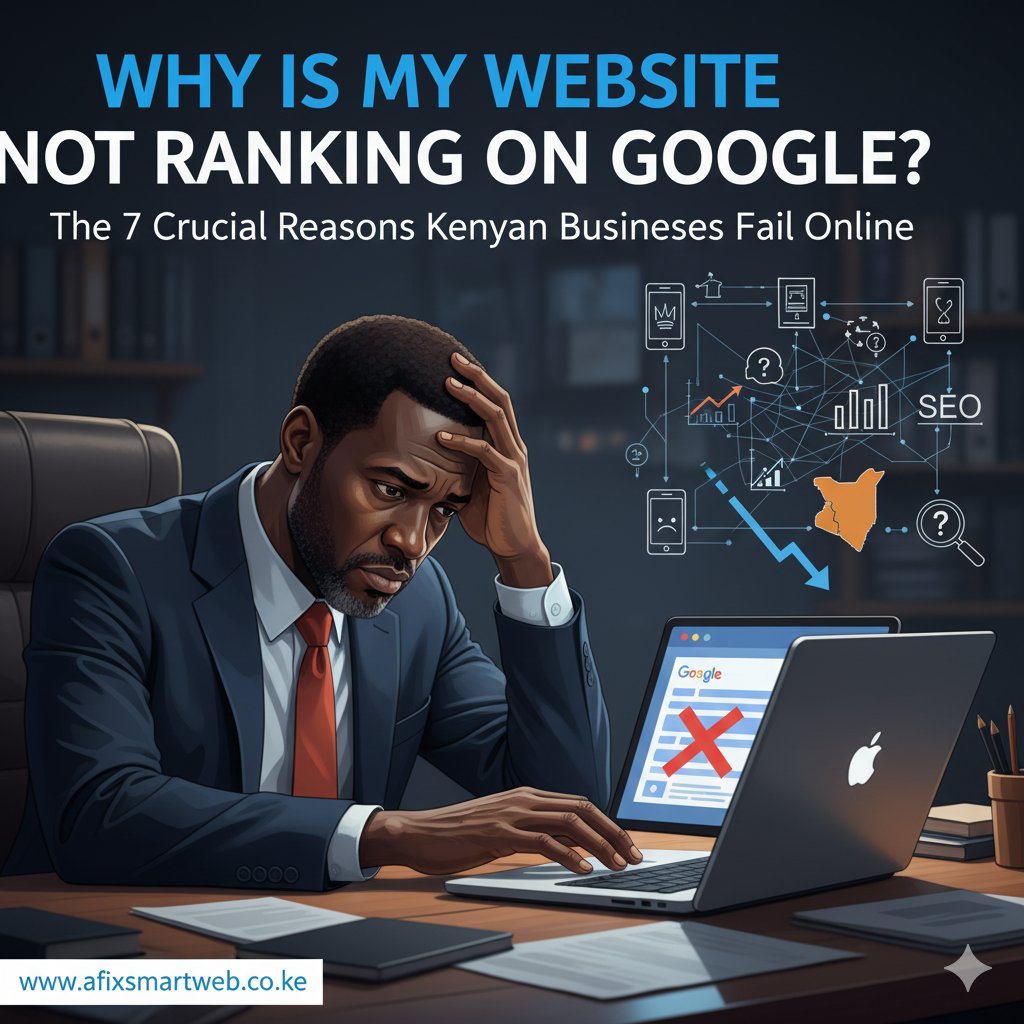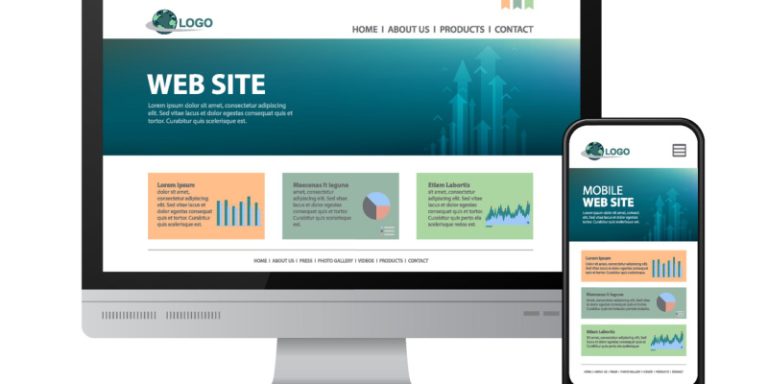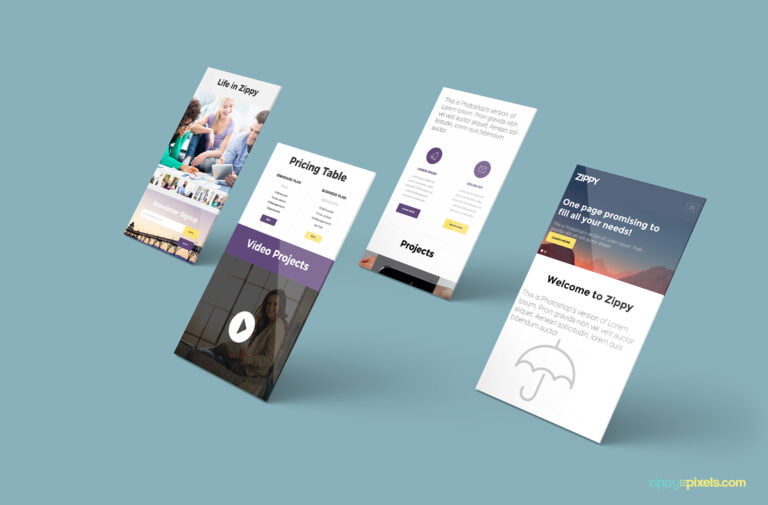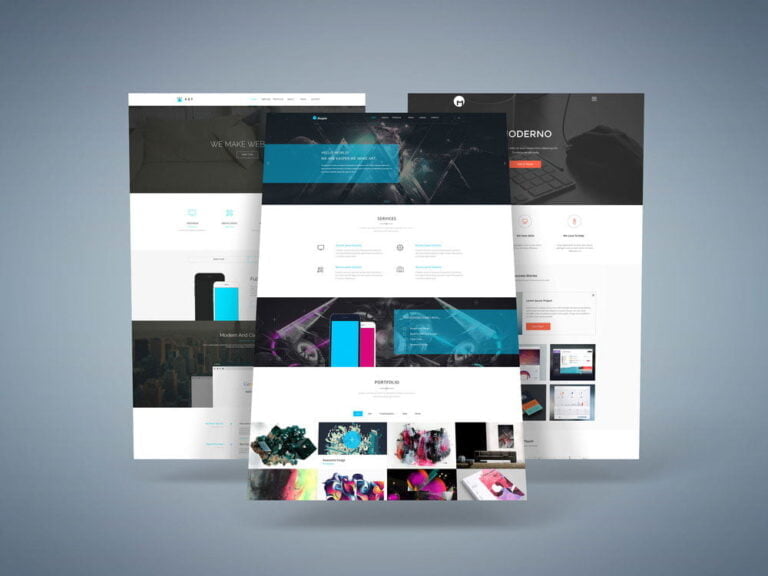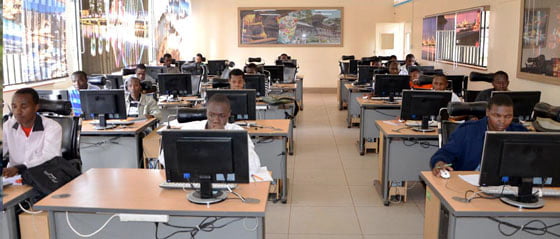As a business owner in Kenya, you’ve invested in a website, perhaps with big dreams of attracting new customers, showcasing your products, or building your brand online. But weeks, months, or even years go by, and your site remains hidden on the forgotten pages of Google search results.
You’re not alone. Many businesses face this frustrating challenge. Your website is an invaluable asset, but only if it can be found. At Afix Smart Web, we hear this question constantly: “Why isn’t my website ranking on Google?”
The good news? The reasons are usually identifiable and, more importantly, fixable. Let’s dive into the core issues preventing your Kenyan business website from shining on Google.
1. Your Website Is Not Mobile-Friendly (Or It’s Too Slow!)
In Kenya, mobile internet usage is incredibly high. Google knows this, which is why mobile-friendliness and website speed are critical ranking factors.
The Mobile Experience: If your website looks clunky, hard to navigate, or broken on a smartphone, Google will penalize you. Users will quickly leave, sending a signal to Google that your site isn’t providing a good experience.
The Speed Factor: We live in an instant-gratification world. If your website takes more than 3 seconds to load, potential customers will bounce. Google views slow websites as poor user experiences and will prioritize faster-loading competitors.
Solution: Ensure your website is “responsive,” meaning it adapts seamlessly to any screen size. Optimize images, leverage browser caching, and consider a faster hosting provider to improve loading times.
2. You Have Zero (Or Poor) SEO
Search Engine Optimization (SEO) is the process of making your website more visible to search engines. If you’re not actively doing SEO, you’re essentially telling Google to ignore you.
Missing Keywords: Are you using the words and phrases your potential customers are actually typing into Google when searching for your services or products? If not, Google won’t connect your site to those searches.
No On-Page Optimization: This includes things like proper title tags, meta descriptions, header tags (H1, H2, H3), and image alt text. These elements tell Google what each page of your site is about.
Lack of Local SEO: For Kenyan businesses, optimizing for local searches (e.g., “web design Nairobi,” “restaurant Mombasa”) is crucial. Are you listed on Google My Business and other local directories?
Solution: Conduct thorough keyword research relevant to your niche and location. Implement these keywords naturally throughout your website’s content and technical elements. Set up and optimize your Google My Business profile.
3. Thin, Duplicate, or Low-Quality Content
Content is king, but only if it’s high quality, unique, and valuable.
Thin Content: Pages with very little text (e.g., just a few sentences) offer little value to users or Google.
Duplicate Content: Copying text from other websites (or even from other pages on your own site) can lead to penalties from Google.
Low-Quality Content: Content that is poorly written, full of grammatical errors, or doesn’t provide helpful information will struggle to rank. Google wants to show its users the best and most relevant information.
Solution: Focus on creating unique, in-depth, and engaging content that genuinely answers your audience’s questions and provides value. Aim for well-researched blog posts, detailed service descriptions, and informative guides.
4. Technical SEO Errors Are Holding You Back
Even if your content is great, technical issues can create invisible barriers for search engines.
Crawlability Issues: If search engine “spiders” (bots that discover content) can’t properly access and read your website, they can’t rank it. This might be due to a faulty sitemap, robots.txt file, or broken internal links.
Indexing Problems: Sometimes, even if Google can crawl your site, it might choose not to “index” certain pages, meaning they won’t appear in search results.
Broken Links (404 Errors): Too many broken links on your site (both internal and external) create a poor user experience and can signal to Google that your site is not well-maintained.
Solution: Regularly audit your website for technical SEO issues. Use tools like Google Search Console to identify and fix crawl errors, indexing problems, and broken links.
5. Lack of Backlinks (No Authority)
Imagine your website is a new restaurant. If no one is talking about it or recommending it, how will others know it’s good? Backlinks are like votes of confidence from other websites.
What are Backlinks? When another reputable website links to your site, it tells Google that your content is trustworthy and authoritative.
Quality Over Quantity: Not all backlinks are equal. A link from a highly respected industry blog or news site carries far more weight than a link from a low-quality, spammy directory.
New Websites Struggle: Brand new websites often lack the “domain authority” that established sites have, making it harder to rank without a concerted effort to earn quality backlinks.
Solution: Implement a link-building strategy. This could involve creating highly shareable content, reaching out to industry influencers, guest blogging on relevant sites, or listing your business in reputable directories.
6. Ignoring or Ignoring Local SEO
For businesses targeting customers in specific regions of Kenya, local SEO is non-negotiable.
Google My Business: This is your most powerful tool for local visibility. An optimized and verified Google My Business profile helps you appear in local search results and on Google Maps.
Local Citations: Consistent name, address, and phone number (NAP) information across various online directories (e.g., Yelp, Yellow Pages, local business listings) boosts your local presence.
Local Reviews: Positive reviews from local customers on your Google My Business profile significantly impact trust and local rankings.
Solution: Claim and thoroughly optimize your Google My Business profile. Actively encourage customers to leave reviews. Ensure your business information is consistent across all online platforms.
7. You Haven’t Been Patient Enough (Or Consistent!)
SEO is not a one-time fix; it’s an ongoing process that requires patience and consistency.
Google Takes Time: It takes time for Google to crawl, index, and evaluate your website, especially if it’s new. Don’t expect instant results overnight.
Competitor Landscape: You’re not operating in a vacuum. Your competitors are also working to rank. You need to consistently out-optimize them.
Algorithm Changes: Google’s algorithms are constantly updated. What worked last year might not work today, requiring continuous adjustments to your strategy.
Solution: View SEO as a marathon, not a sprint. Implement a consistent SEO strategy and regularly monitor your progress. Be prepared to adapt and refine your approach based on performance data and Google’s updates.
Ready to Fix Your Website’s Google Ranking?
If your website isn’t ranking, it’s not because Google doesn’t like you; it’s because there are specific, addressable issues holding it back. Identifying and fixing these problems requires expertise, strategy, and consistent effort.
Don’t let your valuable business disappear into the depths of search results. At Afix Smart Web, we specialize in helping Kenyan businesses like yours climb to the top of Google. We understand the local market and the technical nuances needed to get you noticed by your ideal customers.
Get a Free Website Audit Today! Let us analyze your current website and pinpoint the exact reasons it’s not ranking. We’ll provide you with a clear roadmap to online success.
Contact Afix Smart Web Today!
Website: www.afixsmartweb.co.ke
Email: info@afixsmartweb.co.ke
Phone: +254 714730427
Location: Nairobi, Kenya

